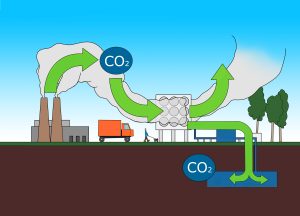 Matrix Solutions recently conducted a desktop feasibility assessment for the Strathcona Industrial Area (SIA) located approximately 17 km SW of Alberta’s Industrial Heartland. Based on the feasibility assessment analysis methods and required criteria, six saline aquifers, one gas reservoir and two oil reservoirs were identified as potential carbon capture, utilization, and storage (CCUS) targets within the study area.
Matrix Solutions recently conducted a desktop feasibility assessment for the Strathcona Industrial Area (SIA) located approximately 17 km SW of Alberta’s Industrial Heartland. Based on the feasibility assessment analysis methods and required criteria, six saline aquifers, one gas reservoir and two oil reservoirs were identified as potential carbon capture, utilization, and storage (CCUS) targets within the study area.
Click to view our white paper on Carbon Capture, Utilization and Storage feasibility.
WHAT IS CCUS?
Carbon capture, utilization, and storage is the process of capturing carbon dioxide (CO2) emissions to store in geological media or to use in enhanced oil recovery (EOR) operations. Alberta is unique in that the majority of the Alberta basin has been identified as suitable for CO2 storage in geological media.
CCUS systems can be mega scale (i.e. a storage hub utilized by multiple operators) or can be utilized on an individual project-scale. These systems can be included in plans for upcoming projects or retrofitted into existing projects.
A critical first step in developing a CCUS system is conducting a desktop feasibility study to establish the regional geologic and hydrogeologic setting.
WHY IS IT IMPORTANT?
A feasibility study is essential to determine geological formation temperature and pressure trends and ultimately, potential CCUS geologic targets. CCUS can contribute to a reduction in greenhouse gas intensity and is an important component of Canada’s transition to a low-carbon energy future.
HOW CAN MATRIX SOLUTIONS HELP?
Matrix can conduct feasibility assessments on various scales to establish regional geologic and hydrogeologic settings. Our team then uses these results for additional, site-specific studies.
CONTACT US
- Sarah Rampersaud, B.Sc., P.Geo. | Hydrogeologist | srampersaud@matrix-solutions.com
- Alex Haluszka, M.Sc., P.Geo. | Senior Hydrogeologist | ahaluszka@matrix-solutions.com
- Brian Fuchs, P.Eng. | Vice President, Operations | bfuchs@matrix-solutions.com

